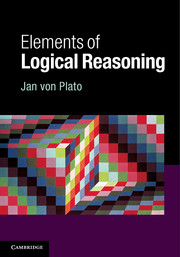Book contents
- Frontmatter
- Contents
- Preface
- PART I First steps in logical reasoning
- Part II Logical reasoning with the quantifiers
- 8 The quantifiers
- 9 Derivations in predicate logic
- 10 The semantics of predicate logic
- Part III Beyond pure logic
- Part IV Complementary topics
- Suggestions for the use of this book
- Further reading
- Bibliography
- Index of names
- Index of subjects
10 - The semantics of predicate logic
Published online by Cambridge University Press: 05 June 2014
- Frontmatter
- Contents
- Preface
- PART I First steps in logical reasoning
- Part II Logical reasoning with the quantifiers
- 8 The quantifiers
- 9 Derivations in predicate logic
- 10 The semantics of predicate logic
- Part III Beyond pure logic
- Part IV Complementary topics
- Suggestions for the use of this book
- Further reading
- Bibliography
- Index of names
- Index of subjects
Summary
Similarly to classical propositional logic, the classical form of predicate logic has a simple semantics. Kripke semantics for intuitionistic predicate logic instead has the complication that the domain of individual objects is not given once and for all.
Interpretations
(a) The semantics of classical predicate logic. The semantics of classical propositional logic presented in Section 7.1 was based on the idea that in each concrete situation, the truth values of atomic formulas are determined. The formal presentation was in terms of valuations, i.e., assignments of truth values to the atomic formulas. In predicate logic we have a domain of individuals and the atomic formulas make statements about the properties of individuals and relations among them. The basic ideas of the semantics of classical predicate logic were already given in Section 8.2: As explained there, the schematic atomic formulas get interpreted in a given domain, and a universal formula ∀x A(x) is true under an interpretation if each of its instances A(a), A(b), A(c),… is true, and an existential formula ∃x A(x) is similarly true if there is some instance A(a) that is true under an interpretation.
If a domain is infinite, as in the case of the natural numbers, it is not possible to go through all the instances of a formula A(x) with a free variable. In the Frege–Gentzen explanation of the universal quantifier in Section 8.2, provability of ∀x A(x) required a proof of A(y) for an arbitrary y. This condition is stronger than the truth condition for a universal formula.
- Type
- Chapter
- Information
- Elements of Logical Reasoning , pp. 152 - 158Publisher: Cambridge University PressPrint publication year: 2014



